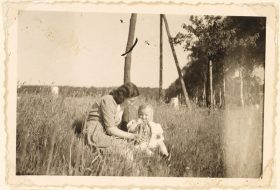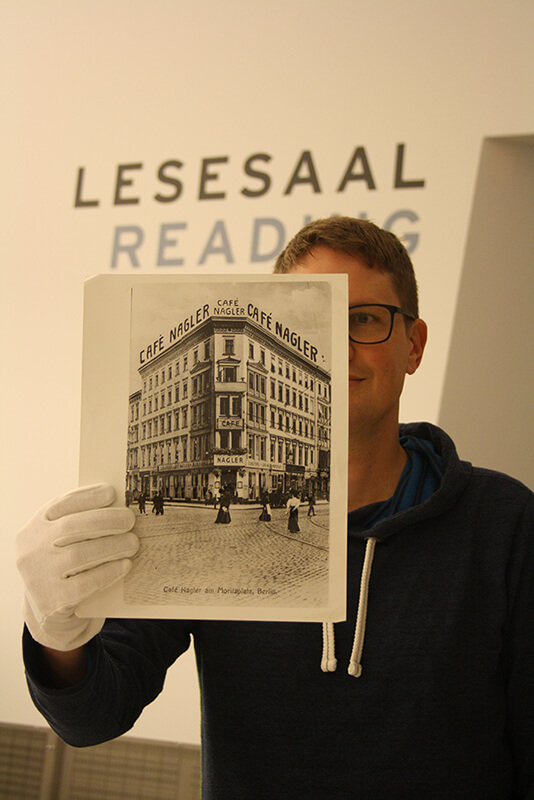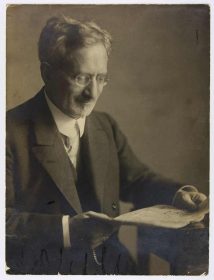The third episode in our blog series “Memories from the Life of Walter Frankenstein”
“Her and no one else,” said Walter Frankenstein the first time he saw his future wife Leonie Rosner in the courtyard of the Auerbach Jewish Orphanage. Leonie was from Leipzig and in Berlin she had begun training at the Jewish Seminar for Nursery School Teachers.

Leonie Frankenstein with her son Peter-Uri sitting in a meadow, Brzeźno in Gorzów County (German: Briesenhorst), May 1944; Jewish Museum Berlin, gift of Leonie and Walter Frankenstein
After it was closed, she came to the Auerbach Jewish Orphanage as an apprentice. Soon after her arrival, Leonie’s room quickly became the place where apprentices living in the orphanage met. Seventeen-year-old Walter grew closer to Leonie (three years his senior) over conversations about religion, Judaism, emigration to Palestine, and daily life. In fall 1941, after the director threatened to fire Leonie over her behavior toward a student, the young couple decided to leave “Auerbach”. Walter and Leonie subletted a room with the Mendel family in Prenzlauer Berg. Soon after that they decided to get married. They had heard that married couples would be spared deportation. Under-aged Walter had to get his mother’s permission for the wedding, which took place on February 10, 1942.
→ continue reading
On the trail of a coffee shop
It was a very special moment for me when I got to unpack recently a new collection for the Archive. A small package from Tel Aviv lay in front of me. The sender was Mor Kaplansky, an Israeli film-maker, with whom I had been corresponding since spring of this year.

Unpacking the collection of the Family Nagler; Jewish Museum Berlin; photo: Ulrike Neuwirth
It had all begun in March, at the finissage of Nosh, the Jewish Food Week. In a small café in Kreuzberg, the documentary film Café Nagler had just been shown. The film is about a coffee shop of that name, which had once stood on the Moritzplatz. While in Berlin today, there is no evidence that the café ever existed at the site, descendants of the Naglers in Israel have kept its memory alive right through the present day. The film moved me greatly. I was excited to see on the screen that Naomi, grandmother of the film-maker, had preserved certain treasures such as a coffee service with the emblem of the café and a set of silverware bearing the initials “N”. I also noticed various photographs and documents.
→ continue reading
The 1930 German Federal Election

Heinz Arzt reading the newspaper, 1920; Jewish Museum Berlin, gift of Hilde Pearton, née Bialostotzky
Recently I was leafing through the inventory listing of a family collection that has been in our archives for many years. I wanted to rework the index in order to bring it up to our current standards. The collection included documents, photographs, and objects from the Arzt and Bialostotzky families. In the twenty-three page inventory, a letter was listed for the Berlin liqueur manufacturer Heinz Arzt (1866–1931) in the category “correspondence,” but neither a sender nor recipient was listed, to say nothing of its contents. The extremely brief description went: “Letter: hand-written, 14 Sept. 1930.”
So I went into the archives and pulled the document numbered 2001/219/28 from box 451 to complete the listing. Suddenly, I was holding a fascinating piece of history in my hands: the so-called letter turned out to be a brief report on the Reichstag election eighty-seven years ago. → continue reading


